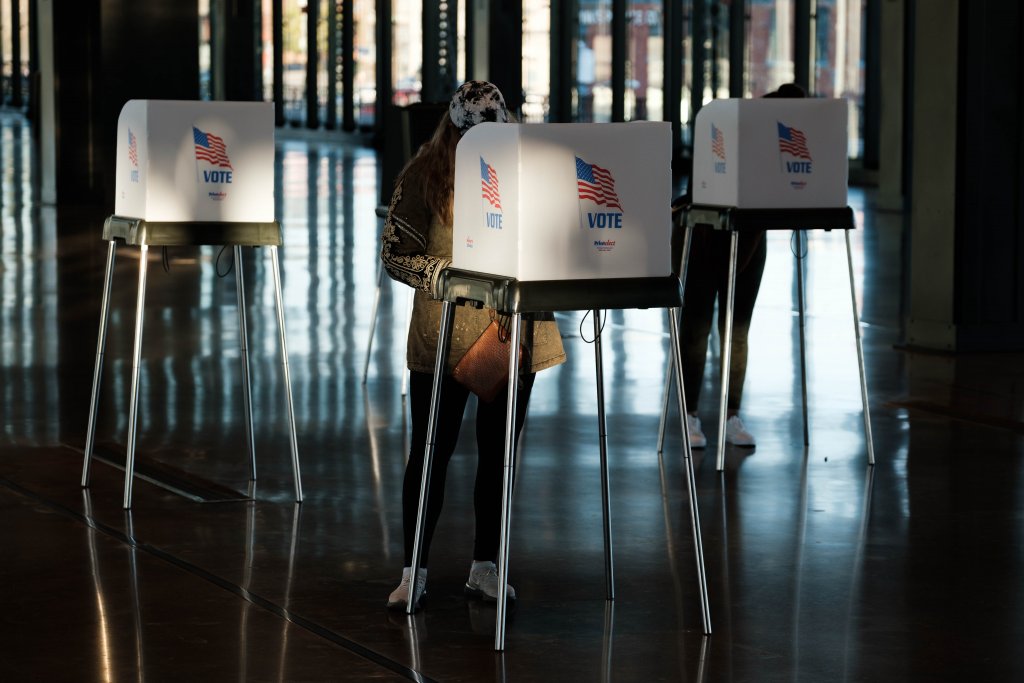Voters cast ballots at Main Street Station in Richmond in 2020. (Ned Oliver/Virginia Mercury)
(VM) – Despite getting several extra months to negotiate, Virginia lawmakers went home for the summer without a deal on proposals to limit partisan influence in the state’s election bureaucracy.
BY GRAHAM MOOMAW
Legislation that would have removed the governor’s power to appoint the state elections commissioner and given the two major parties equal representation on the State Board of Elections effectively died for lack of a final vote. The General Assemly didn’t take up two pending bills on the topic when lawmakers met in Richmond this month to finish work on the state budget, which was supposed to be done in March.
All the bills left unfinished are technically still alive because the General Assembly adjourned its special session to Sept. 7, a move explained as a way to take action later on an unfilled seat on the State Corporation Commission. But anything not approved at this point is effectively dead, said Garren Shipley, a spokesman for House of Delegates Speaker Todd Gilbert, R-Shenandoah.
“The remaining conference reports, while they are still technically viable until the session adjourns sine die, are unlikely to move forward,” Shipley said.
It’s unclear exactly what caused the talks to fail, but the state elections board flipped to Republican control during the negotiations due to the resignation of a Democratic member who had been appointed to a judgeship. While the bills were pending, Gov. Glenn Youngkin swapped out the state’s former elections commissioner, Chris Piper, for his own appointee, Susan Beals, a former Republican member of the Chesterfield County Electoral Board.
“I got the impression that the House lost interest,” said Sen. Adam Ebbin, D-Alexandria, who chairs the Senate Privileges and Elections Committee.
Del. Margaret Ransone, R-Westmoreland, who chairs the House Privileges and Elections Committee, said lawmakers couldn’t reach consensus and had to turn their attention elsewhere.
“There were so many things happening during the session, so we sort of let it go,” Ransone said.
Under Virginia’s system, the governor gets to hire the state’s top election official, a job that involves verifying election results and ensuring the voting process runs smoothly. The governor’s party also automatically gets a majority of the seats on the elections board, which votes to certify election winners and adjudicates some election-related complaints.
The state board flipped to a GOP majority last month when Younkin appointed Georgia Alvis-Long, a former Republican member of the Augusta County Board of Elections, to fill the vacancy left when Jamilah D. LeCruise became a judge. That gave the GOP three of five seats, but former Democratic delegate Bob Brink will continue to serve as the board’s chairman until early next year.
There have been no major controversies in Virginia recently over explicit partisanship in those roles. After the 2020 election, the Virginia board certified President Joe Biden’s resounding, double-digit victory in the state and the 13 Electoral College votes that came with it. But election oversight has taken on renewed importance across the country due to the staying power of baseless election conspiracies and some Republicans’ willingness to spread them.
Youngkin, who emphasized “election integrity” in last year’s campaign, supported the proposal to eliminate his office’s power to hire and fire the elections commissioner. But he still had the power to appoint Beals, who appears to have been largely well-received in the Virginia elections world and has stayed out of the political fray since her appointment in March.
Republican-backed bills to make the commissioner answer to the bipartisan state board instead of the governor were pitched as a way to avoid the appearance of partisanship in the future, not as a response to any specific issue with past commissioners.
There’s been disagreement over how exactly a revamped elections board would function. Some Democratic lawmakers raised concerns that equalizing partisan representation could cripple the board by opening the door to deadlocked votes.
The version of the bill that passed the Democrat-led Senate would have created an eight-member board, with four seats allotted to each of the two highest-finishing parties in the most recent gubernatorial election. Under that proposal, retired judges would be appointed to break ties.
Ransone said disagreement over having a judge act as tiebreaker was a main sticking point.
The alternative approved by the GOP-controlled House created a seven-member board, with four seats going to the governor’s party.
Both bills initially passed with nearly unanimous bipartisan support.
The General Assembly recently expanded the elections board from three members to five, a change intended to make the board more efficient and less reliant on the near-perfect attendance of each member.
Another unfinished election bill would have tweaked security rules for absentee voting through the mail. Current law requires voters who mail in their ballots to include a signature from another person who witnessed the process. That loosely enforced rule came under scrutiny during the COVID-19 pandemic, with voting rights groups arguing it was an unnecessary complication for people who lived alone and were trying to isolate from others. A bill left in a conference committee would have made the witness signature optional and allowed voters to verify their identity with their date of birth and partial Social Security number.



